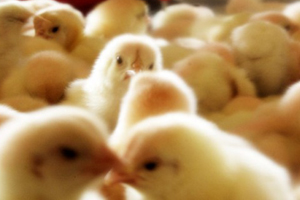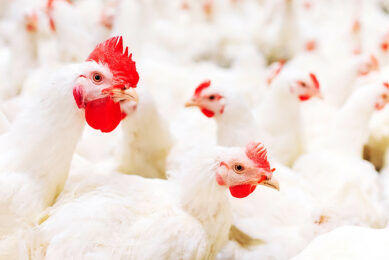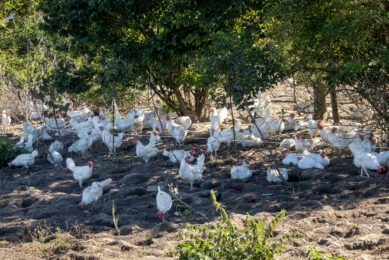Effect of lipotropic agents in broiler chicks on high-energy diets

The present study was performed to investigate the effects of supplemental choline and carnitine on performance, antibody responses and some serum metabolites related to liver health in broiler chicks fed on high-energy diets.
A total of 540 day-old Ross 308 chicks were randomly distributed between 9 experimental diets according to a 3 × 3 factorial arrangement of treatments including three dietary metabolisable energy (ME) levels (control, and 0.42 and 0.84 MJ/kg greater) and three status of dietary supplementation with lipotropic agents (control diet, or diets supplemented with either 1000 mg/kg choline as choline chloride or 100 mg/kg carnitine as L-carnitine) with 5 replicates of 12 birds each. Average daily feed intake (ADFI), average daily weight gain (ADWG) and feed conversion ratio (FCR) was recorded during the 42 d feeding trial.
At the end of experiment, two randomly-selected birds per each replicate were slaughtered to measure liver fat. Also, serum samples were taken after immunization against Newcastle (NDV) and infectious bronchitis (IBV) disease viruses.
The results showed that increase in dietary ME level caused an increase (P < 0.05) in adwg and decrease (p >< 0.01) in adfi, whereby improved (p >< 0.01) fcr values. similarly, dietary supplementation with lipotropic agents (particularly choline) decreased (p >< 0.001) adfi and improved fcr values especially in birds fed on diets containing 0.42 mj me kg greater than control. although increase in dietary me level improved (p >< 0.05) antibody responses to ndv (only at d 12 post vaccine inoculation) and ibv compared with control diet, choline or carnitine supplementation of diets did not affect antibody production titers against both viral antigens. supplemental lipotropic factors decreased (p >< 0.01) serum thiobarbituric acid-reactive (tbars) substances, but increasing dietary me level had an incremental effect (p > 0.05) on TBARS value compared with control diet. While increase in dietary ME level resulted (P < 0.001) in higher activity of serum alanine-aminotransferase (alt), the activity of alt as well as aspartate-aminotransferase were reduced (p >< 0.05) as a result of introducing lipotropic agents into the diets. interestingly, dietary supplementation of lipotropic factors increased serum triiodotyronin concentration and reduced liver fat percentage (p >< 0.01). dietary inclusion of carnitine caused a marked (p >< 0.01) increase in serum triglycerides at d 42 of age.>
The present findings suggest that while high-energy diets improve broiler growth performance, dietary supplementation of choline and/or carnitine could remove probable unfavourable impacts of these diets via reducing liver fat and probably maintaining liver health.
Corresponding author. Department of Animal Sciences, College of Agriculture, Isfahan University of Technology
[Source: Science Direct]











